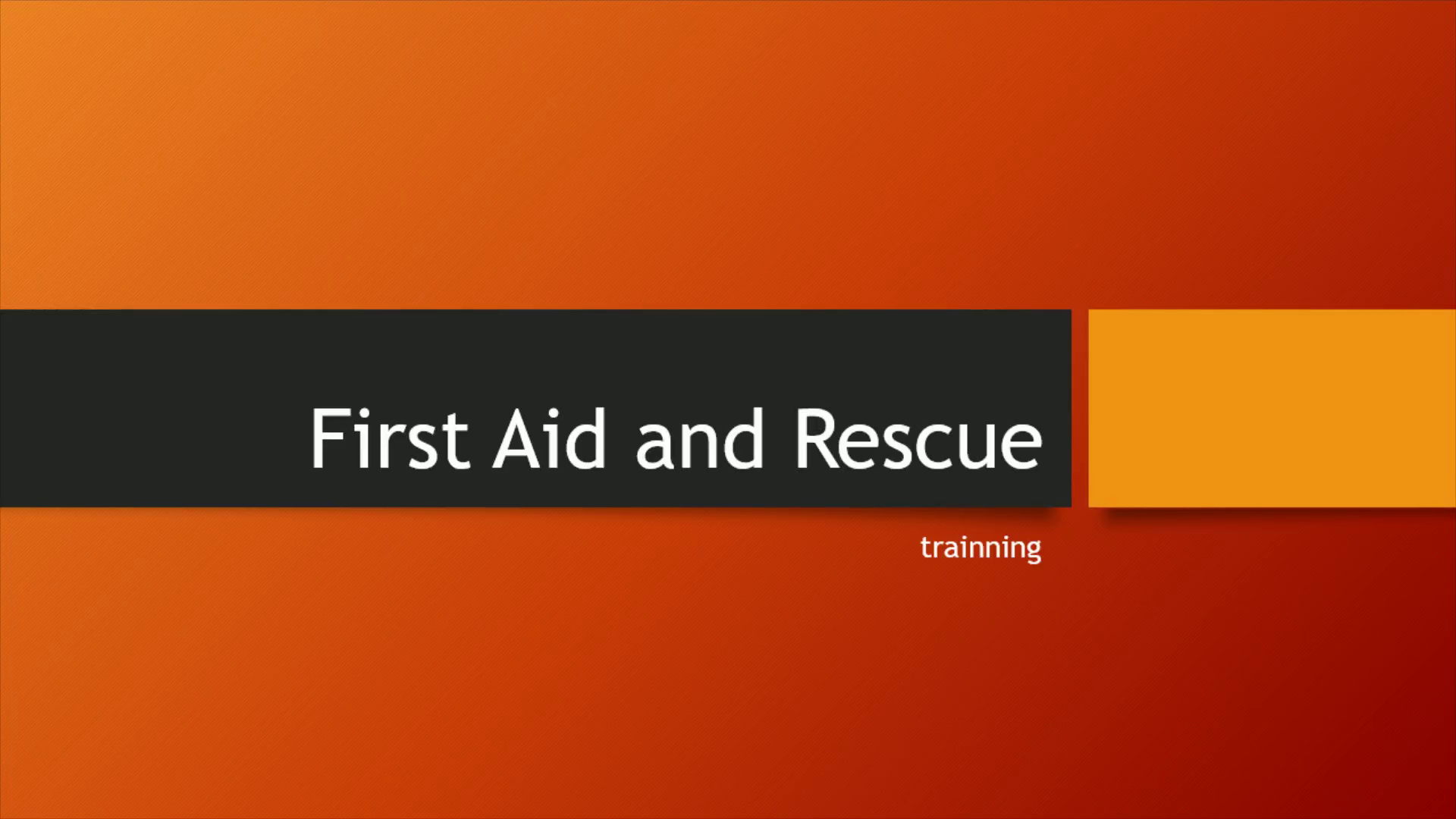
First Aid and Rescue
Scene 1 (0s)
First Aid and Rescue. trainning.
Scene 2 (6s)
First Aid and Rescue. 1.First Aid and Purpose 2. Primary survey and DR’S ABC D and CPR 3.Severe Bleeding 4. First Aid: Cuts and Bruises 5.Symptoms and First Aid for Heart Attack 6. Unresponsive Casualty 7. Recovering Position 8. Fainted Causes and Treatment 9.How to Treat as Asthma 10. Someone is having a Diabetic Emergency 11.Chocking 12. Sprains and Strains 13. Nose Bleeding 14. Carrrying or Transport of injurd 15. Bandaging 16. Burn 17. Fracture.
Scene 3 (31s)
FIRSDT AID. FIRST AID – IS EMERGENCY CARE GIVEN IMMEDIATELY TO AN INJURED PERSON. PURPOSE – IS TO MINIMIZE INJURY AND FUTURE DIS-ABILITY IN SERIOUS CASES..
Scene 4 (42s)
PRIMARY SURVEY and DR’S ABC D. .. It should be quick, orderly to treat our casualty in order of priority .. We use the initials DR’S ABC D – To remind us of the steps we need to follow..
Scene 5 (55s)
DR’S ABC D. D – ( DANGER ) When you see a casualty, first you need to check for any danger, to make sure its safe for you to approach them. You don’t want to become a casualty. example: snake/ snake bite / poisoning / in the middle of the road / in the middle of a ramble. ..
Scene 6 (1m 13s)
DR’S ABC D. R ( RESPONSE ) You are going to see if you can get any response from the casualty. Can also use the AVPU scale and each letter can represent the casualty’s level of response. A- Alert / V – Voice / P – Response to pain / U – Unresponsive to any stimuli. a. As you approach, introduce yourself. Ask them question to try to get a response b. If they are not alert and do not response to your voice, kneel down beside them and gently shake their shoulder say “ hello madam or sir, I am joseph, can you hear me? Open your eyes. c. Still not response? You can pinch their ear lobe to see if they respond to pain. Depending on how the casualty response to you will stablish a level of response..
Scene 7 (1m 47s)
DR’S ABC D. S ( SHOUT FOR HELP ) as any assistance will be helpul . a. Your own security b. To assist you and helping you.
Scene 8 (1m 57s)
DR’S ABC D. A ( AIR WAY ) a. If there’s no response you need to check their AIR WAY. b. If the casualty is alert and speaking to you, you know that there is no problem with the AIR WAY. Its clear. UNRESPONSIVE : Need to open the AIR WAY by putting one hand on the forehead and gently tilting the head back with two fingers under the chin..
Scene 9 (2m 17s)
DR’S ABC D. B ( BREATHING ) We do this by placing your ear and cheek over their nose and mouth, looking down the body to see if their chest rises and fall. Do this for 10 seconds. Remember: LOOK- for Normal chest movement LISTEN – for Normal sounds FEEL – breath against you face. ….. If the casualty is not response normally call for help. ( Ambulance or Hospital ) as them for emergency help and bring AED ( Authomated External Defibrillator ) AED – is used to help those experiencing sudden Cardiac arrest. It’s a suffisticated , yet easy to use , Medical device that can analyze the heart’s rhythm and if necessary, deliver an electric shock, or defibrillation, to help the heart re-stablish and effective Rhythm. … If you are alone, call for emergency help using a mobile on speacker phone. And begin CPR with the chest compression.
Scene 10 (2m 52s)
DR’S ABC D. C ( CIRCULATION ) Means the flow of blood around the b ody and when the heart stops pumping, we need to take over this role by pushing down hard and fast on the chest ( CPR ) or ( AED ) …… If the casualty is breathing normally, so you going to check their circulation..
Scene 11 (3m 8s)
CPR- CARDIOPULMONARY RESUSCITATION.
Scene 12 (7m 3s)
DR’S ABC D ( DEFIBRILLATION ).
Scene 13 (11m 16s)
SEVERE BLEEDING.
Scene 14 (14m 31s)
FIRST AID: CUTS AND BRUISES.
Scene 15 (15m 25s)
SYMPTOMS AND FIRST AID FOR HEART ATTACK.
Scene 16 (18m 58s)
UNRESPONSIVE PATIENT.
Scene 17 (23m 58s)
RECOVERY POSITION ( UNRESPONSIVE BUT BREATHING ).
Scene 18 (26m 29s)
FAINTED CAUSES AND TREATMENT.
Scene 19 (28m 45s)
HOW TO TREAT AN ASTHMA ATTACK.
Scene 20 (31m 46s)
SOMEONE IS HAVING A DIABETIC EMERGENCY.
Scene 21 (36m 33s)
SOMEONE CHOCKING.
Scene 22 (38m 57s)
SPRAINS AND STRAINS.
Scene 23 (41m 49s)
NOSE BLEEDING.
Scene 24 (43m 9s)
BANDAGING TECHNIQUE.
Scene 25 (48m 9s)
RING BANDAGE.
Scene 26 (50m 43s)
BANDAGING 2.
Scene 27 (55m 43s)
TYPRES OF FOLDING AND BANDAGING 3.
Scene 28 (1h 0m 43s)
TRANSPORT OF INJURD ( CARRYING ).
Scene 29 (1h 1m 42s)
CARRIES AND DRAGS.
Scene 30 (1h 6m 42s)
BURNS.
Scene 31 (1h 8m 12s)
FRACTURE.
Scene 32 (1h 12m 48s)
END. THANK YOU LADIES AND GENTLEMEN I HOPE YOU ENJOYED LEARNED SOMETHING.